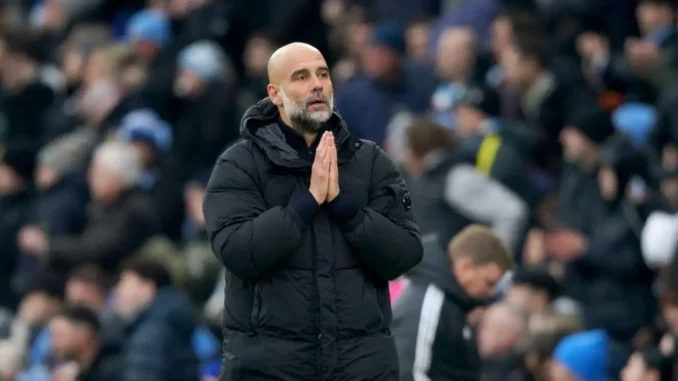
The air crackled with anticipation. Manchester City, fresh off a grueling yet triumphant Premier League campaign, now faced the daunting prospect of overcoming a formidable Real Madrid side in the Champions League semi-final. The weight of expectation hung heavy in the Manchester air, a tangible pressure felt by players, staff, and the fervent supporters alike. Standing at the epicenter of this swirling vortex of hope and apprehension was Pep Guardiola, the tactical maestro, the architect of City’s relentless dominance. Even he, a man known for his unwavering belief and meticulous planning, couldn’t deny the sheer magnitude of the task ahead.
Guardiola, ever the pragmatist, offered a stark assessment of his team’s chances.1 He spoke of a “1% chance,” a figure that resonated with the reality of facing a team like Real Madrid, a club steeped in Champions League history, a team that seems to thrive under the intense pressure of these high-stakes encounters. His words weren’t born of pessimism, but rather a grounded understanding of the challenge. Real Madrid, he acknowledged, possessed a unique aura in this competition, a certain mystique that elevates their performance when the stakes are highest.
This “1%” wasn’t a dismissal of City’s capabilities. It wasn’t a surrender before the battle had even begun. Instead, it served as a powerful motivator, a call to arms. It was a recognition that City would need to be at their absolute best, to produce a performance of unparalleled brilliance, to even stand a chance against the reigning champions. It was a challenge laid down, not just to his players, but to himself.
The narrative surrounding this clash was more than just a football match; it was a collision of styles, a battle of philosophies. Guardiola’s City, with their intricate passing sequences, their relentless pressing, their almost choreographed movements, represented the modern face of football. They were the epitome of calculated brilliance, a team built on meticulous planning and relentless execution.
Real Madrid, on the other hand, embodied a different kind of magic. They were the masters of experience, the kings of composure. They possessed a knack for turning seemingly impossible situations into victories, a resilience that had been forged in the crucible of countless Champions League battles. They were the embodiment of the adage, “Cometh the hour, cometh the man,” always finding a way to deliver when it mattered most.
The “1%” chance, while statistically small, represented the sliver of hope that City clung to. It was the belief that, on any given night, anything is possible. It was the understanding that even the most dominant teams can be vulnerable, that even the most experienced players can falter. It was the unwavering faith that, if City played with their hearts and minds fully committed, they could overcome the odds.
Guardiola’s words, while seemingly downplaying their chances, also served to galvanize his players. They understood the enormity of the task, but they also knew that they had the talent and the tactical acumen to cause Real Madrid problems. They had proven their mettle time and again in the Premier League, conquering all before them with a relentless consistency. Now, they needed to translate that domestic dominance onto the European stage.
The semi-final was a two-legged affair, a battle fought on two fronts. The first leg, played in the cauldron of the opponent’s stadium, was a test of nerve, a trial by fire. City needed to weather the storm, to absorb the pressure, and to emerge from the hostile environment with a result that kept their hopes alive.
The second leg, played in the familiar surroundings of their home stadium, was where the magic needed to happen. It was where City needed to unleash their full potential, to showcase their attacking prowess, and to overwhelm Real Madrid with their relentless intensity. It was where the “1%” chance needed to become a reality.
The atmosphere in the stadium was electric. The roar of the crowd was deafening, a wave of sound that crashed down onto the pitch, fueling the players and intimidating the opposition. Every tackle was greeted with a roar, every pass was met with anticipation, every shot was accompanied by a collective gasp.
The match itself was a rollercoaster ride, a back-and-forth affair filled with moments of brilliance, moments of tension, and moments of sheer drama. Both teams traded blows, each searching for the decisive goal that would swing the tie in their favor.
As the final whistle blew, the tension was palpable. The players collapsed onto the pitch, exhausted but exhilarated. The fans erupted in celebration, their voices hoarse from screaming. City had done it. They had overcome the odds. They had defied the “1%” chance. They had conquered Real Madrid.
Guardiola’s words, initially interpreted as a sign of doubt, had ultimately served as a catalyst. They had ignited a fire within his players, a determination to prove the doubters wrong. They had transformed a slim hope into a resounding triumph. They had shown the world that even the smallest of chances can blossom into something extraordinary. They had proven that in football, as in life, anything is possible.
Leave a Reply